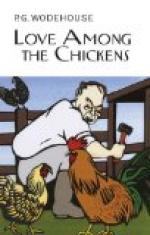I sat on the seat at the end of the Cob and watched the professor. It was an instructive sight, an object-lesson to those who hold that optimism has died out of the race. I had never seen him catch a fish. He never looked to me as if he were at all likely to catch a fish. Yet he persevered.
There are few things more restful than to watch some one else busy under a warm sun. As I sat there, my pipe drawing nicely as the result of certain explorations conducted that morning with a straw, my mind ranged idly over large subjects and small. I thought of love and chicken-farming. I mused on the immortality of the soul and the deplorable speed at which two ounces of tobacco disappeared. In the end I always returned to the professor. Sitting, as I did, with my back to the beach, I could see nothing but his boat. It had the ocean to itself.
I began to ponder over the professor. I wondered dreamily if he were very hot. I tried to picture his boyhood. I speculated on his future, and the pleasure he extracted from life.
It was only when I heard him call out to Hawk to be careful, when a movement on the part of that oarsman set the boat rocking, that I began to weave romances round him in which I myself figured.
But, once started, I progressed rapidly. I imagined a sudden upset. Professor struggling in water. Myself (heroically): “Courage! I’m coming!” A few rapid strokes. Saved! Sequel, a subdued professor, dripping salt water and tears of gratitude, urging me to become his son-in-law. That sort of thing happened in fiction. It was a shame that it should not happen in real life. In my hot youth I once had seven stories in seven weekly penny papers in the same month, all dealing with a situation of the kind. Only the details differed. In “Not really a Coward” Vincent Devereux had rescued the earl’s daughter from a fire, whereas in “Hilda’s Hero” it was the peppery old father whom Tom Slingsby saved. Singularly enough, from drowning. In other words, I, a very mediocre scribbler, had effected seven times in a single month what the Powers of the Universe could not manage once, even on the smallest scale.
* * * * *
It was precisely three minutes to twelve—I had just consulted my watch—that the great idea surged into my brain. At four minutes to twelve I had been grumbling impotently at Providence. By two minutes to twelve I had determined upon a manly and independent course of action.
Briefly it was this. Providence had failed to give satisfaction. I would, therefore, cease any connection with it, and start a rival business on my own account. After all, if you want a thing done well, you must do it yourself.
In other words, since a dramatic accident and rescue would not happen of its own accord, I would arrange one for myself. Hawk looked to me the sort of man who would do anything in a friendly way for a few shillings.
I had now to fight it out with Conscience. I quote the brief report which subsequently appeared in the Recording Angel:—




